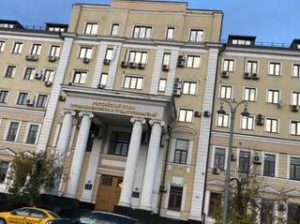English court recognises a Russian arbitral award
In April 2022 the High Court of England and Wales enforced an arbitral award rendered against a British company in Russia under the rules of a Russian arbitral institution.
 In January 2022, the Arbitration Centre at the Russian Union of Industrialists and Entrepreneurs (RSPP) completed arbitration of a dispute arising from an international sale agreement concluded by a Russian company (supplier) with a British counterparty (buyer), subject to English law. As a result of the consideration of the case, the arbitral tribunal awarded to the Russian company the debt for the delivered goods.
In January 2022, the Arbitration Centre at the Russian Union of Industrialists and Entrepreneurs (RSPP) completed arbitration of a dispute arising from an international sale agreement concluded by a Russian company (supplier) with a British counterparty (buyer), subject to English law. As a result of the consideration of the case, the arbitral tribunal awarded to the Russian company the debt for the delivered goods.
The defendant failed to comply with the award voluntarily, so the Russian company applied to the High Court of England and Wales for its recognition. By an order of 25 April 2022 (available-here-in-anonymised-form), the court held the arbitral award conformant with the requirements of the New York Convention 1958 and the Arbitration Act 1996 and permitted its further enforcement “in the same manner as the judgment of the [High] Court”. The order has entered into force.
This is a noteworthy development because of the concerns existing in legal community with regard to perspectives of mutual recognition of judgments and awards in the two countries.
Risk of liability under currency exchange regulation
From a legal point of view, this case had its own peculiarities. In 2018, the two companies concluded a contract for the supply of goods with a total value of more than 2 million euros. The arbitration clause provided that disputes from this contract were subject to arbitration under the rules of the Stockholm Chamber of Commerce. The applicable law in the contract was the law of England and Wales, the language of the proceedings was English.
The seller supplied the goods in several lots. In 2020, all lots were supplied. However, the buyer failed to pay in full according to the terms of the contract. In connection with the non-receipt of foreign exchange earnings under the foreign trade contract, the Russian party faced a serious threat of administrative and criminal liability.
According to the Russian legislation, the failure by a Russian resident to receive (credit) foreign currency due for goods transferred to non-residents within the prescribed period, entails the imposition of an administrative fine. The amount of the fine can constitute up to 75% of the lost revenue.
online pharmacy https://shop.fargoderm.com/wp-content/themes/twentysixteen/inc/new/flexeril.html no prescription drugstore
In case of non-receipt of foreign exchange earnings in the amount of more than 9,000,000 rubles, even the criminal liability measures become applicable. In order to avoid such liability, the Russian exporter must file a claim for the recovery of the debt.
Moving to arbitration in Russia
An important achievement in resolving this problem constituted the use of an alternative arbitration clause. In the course of the contract, the parties contended with the delays in payments and, in order to avoid the risks of liability for non-compliance with currency regulations, changed the terms of the contract and added an alternative arbitration clause.
After analyzing international and domestic trade dispute resolution, as well as assessing the costs and terms of applying to a foreign jurisdiction, the parties decided to refer the dispute to the Arbitration Centre at the Arbitration Centre at the Russian Union of Industrialists and Entrepreneurs, which handles disputes both in international and domestic commercial arbitration.
Competitive advantages of Russian arbitral institutions
The parties used an arbitration procedure via video link, professional administration, an arbitrator with competencies in English law, as well as the traditional advantages of arbitration, including confidentiality and the availability of a cross-border mechanism for the enforcement of arbitral awards in most countries of the world. The arbitration fee was definitively lower than in many international arbitral institutions.
The entire proceedings took place electronically. This option greatly facilitates the process of interaction between the participants in the process, while creating additional confidentiality of the dispute without losing the quality of legal proceedings.
From my point of view, arbitration has no real alternative in resolving cross-border contractual disputes. Due to the difficult international situation, foreign arbitral institutions are not always able to provide Russian participants with equal conditions with foreign opponents. This concerns the payment of a fee and the involvement of representatives from the relevant jurisdiction, the possibility of participating in a hearing, etc.
Enforcing the award by the order of the High Court of England and Wales actually confirms that arbitral proceedings in the case met leading international standards and practices and were carried out in accordance with applicable law and rules of arbitration.
online pharmacy https://shop.fargoderm.com/wp-content/themes/twentysixteen/inc/new/cipro.html no prescription drugstore
The order of the English court recognising an arbitral award rendered in Russia in favour of a Russian company against a British company represents a positive sign of rule of law and a successful application of the New York Convention in times of political turbulense.
online pharmacy https://shop.fargoderm.com/wp-content/themes/twentysixteen/inc/new/strattera.html no prescription drugstore











